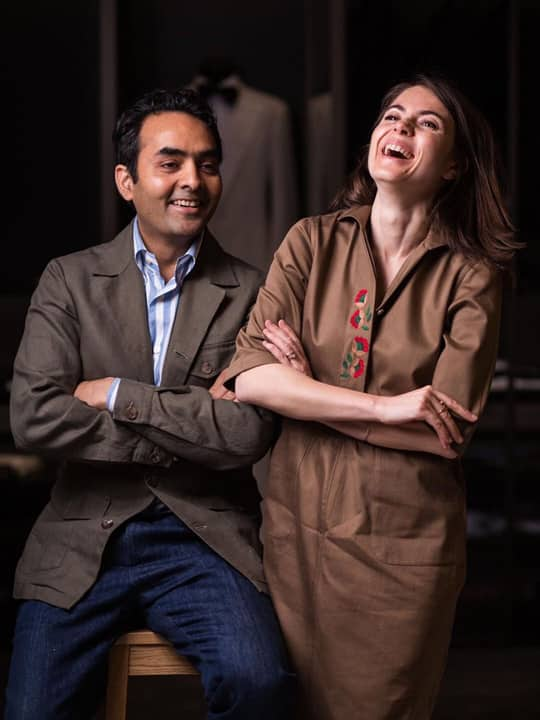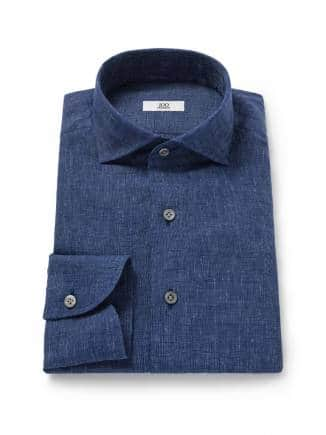



To most people, the term ‘luxury Indian shirtmaker’ wouldn’t quite sound right. They would probably be more used to ‘British’ or ‘Italian’. But the customers of 100Hands, which is based in Amsterdam and makes its shirts in Amritsar, would choose to disagree.
Launched in 2015 by former investment bankers Akshat Jain and Varvara Maslova, the luxury Indian shirtmaker sells in 192 high-end stores across the world. It employs over 260 people—among them, pattern masters, cutters, and manual stitching experts—and makes 40,000 shirts a year.
100Hands mostly sells its ready-to-wear, made-to-measure, and bespoke shirts in Europe and America, with prices ranging between Rs 25,000 and Rs 1 lakh.
A 100Hands shirt, which takes anywhere between 16 and 35 hours to make, is distinguished by a high stitch count of 25 per inch, hand-rolled bottoms, and hand embroidery around the edges of the buttonholes, among others. The company’s patrons include cricketing legend Sachin Tendulkar, actor Farhan Akhtar, and former Dutch footballer Edwin van der Saar.
 Akshat Jain and Varvara Maslova
Akshat Jain and Varvara Maslova
Also read: This Amritsar-based firm makes some of the world's best shirts
100Hands, which is audited by the Fair Wear Foundation, also makes shirts for some storied names in London, Paris, and Scandinavia. These include Chittleborough & Morgan on Savile Row and Camps de Luca in Paris. Here, Jain, who is also the scion of a 150-year-old cotton spinning and yarn business, speaks to Moneycontrol about the challenge of breaking into a rarefied circle of shirt making, the work that goes into each of their shirts, and the company’s white label associations.
Your shirts have been described as the finest in the world by style gurus. Where did it all begin?
Our yarn business has this atelier of five brilliant tailors. While growing up, they would stitch shirts for my father, my brother and I, and our family friends. It was a small operation, not even a real business back then.
In 2013, when we were still working as investment bankers in Amsterdam, Varvara and I shopped around for clients. It started with small boutiques which wanted to outsource their operations. Our first client was a Dutch tailor and we acquired several other clients after that.
In 2014, we started talking to tailors on Savile Row, including Chittleborough & Morgan, who immediately knew what we were capable of. Roy Chittleborough and Joseph Morgan, along with Edward Sexton, gave shape to the avant garde creations of Tommy Nutter in the late 1960s. They dressed The Beatles among others. Even today, the shirts we make for them are worn by the likes of Paul McCartney. There is a dearth of high quality suppliers in London and elsewhere, and that is the gap we are filling.
Today, apart from Chittleborough & Morgan, we make about 25,000 shirts a year for the likes of Richard James and Welsh & Jefferies on Savile Row; Camps de Luca and Cifonelli, the two most important tailors in Paris, and A W Bauer & Co., in Stockholm. Camps de Luca sells 100Hands shirts officially.
At present, we have about 50 clients mostly based in Europe, and then there are some in Australia, the US, and Japan. 100Hands grew out of this operation in 2015.
 100Hands factory in Amritsar.
100Hands factory in Amritsar.
How were your products received when they were launched?
It was very tough to break in. For several months, we simply couldn’t get appointments. The British and the Italians pretty much dominate the trade, and there is still this perception that products made in India are inferior and usually priced low.
To get into stores and boutiques, you had to put in a lot more effort as an Indian brand. The Italians and British, to a large extent, pitch provenance, and that is it. But while a shirt might be among the simplest products to make, a lot more can go into it. That’s what we showed the stores we spoke to, and once they saw our work, the entire process became much easier.
Eventually, our Indianness became our strength. I’m aware there are great single malt whiskies and other luxury products coming out of India, but these are too few. We need more instances to cut through the prejudice and change perception.
How long did it take 100Hands to change that perception?
It was a gradual process of educating customers about our quality. To show them the intricate details that go into every 100Hands shirt and why we stand apart from Italian or British-made shirts. That message had to then percolate from owners to sales managers. Overall, it took about five years to establish ourselves at luxury stores around the world. The wages and other benefits we provide to our employees in Amritsar, which are much higher than industry standards, played an important role as well.
 100Hands shirts start at Rs 25,000.
100Hands shirts start at Rs 25,000.
What kind of person buys a 100Hands shirt?
Obviously, because of the price bracket we are in, we cater to a select group of people. But a majority of our buyers are self-made individuals — entrepreneurs who recognise the passion and effort that goes into our shirts and who do the same when it comes to their own products. We have to still say hello to a lot more people, though. There are lot of people who are looking for something special and we need to connect with them, both abroad and in India. These are men who would buy a Prada shirt for 500 euros, but are probably not aware that you can get a product that is way better at the same price or even less.
Where does India fit into your plans?
Compared to Europe or the USA, India is a very small market for us. But we have had a growing number of customers; these are people who have read about us, follow us on social media. They are usually aged between 35 and 40, and they book an appointment and come down to Amritsar. Sometimes, they get their fathers along.
Discover the latest Business News, Sensex, and Nifty updates. Obtain Personal Finance insights, tax queries, and expert opinions on Moneycontrol or download the Moneycontrol App to stay updated!
Find the best of Al News in one place, specially curated for you every weekend.
Stay on top of the latest tech trends and biggest startup news.